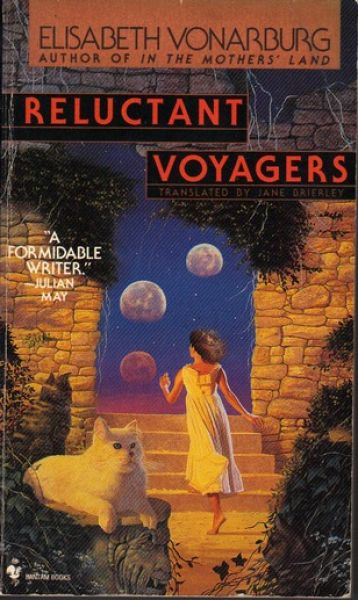The observer effect is universal
Reluctant Voyagers
By Élisabeth Vonarburg

8 Oct, 2014
0 comments
When I selected this, I had no memory of the plot at all despite the fact my copy of the book is well worn. It seemed suitable that issues of history, forgotten and rewritten, play such a central role in this novel of the mid-1990s so I thank the endless series of head injuries I have suffered for their contribution to this reading experience.
Catherine Rhymer is an immigrant resident in what at first glance could be familiar Montréal as it existed in the late 1980s. It very soon becomes obvious that this is not the former queen city we all know but a much darker one where efforts to contain and eliminate the heritage of the French Canadians were much more heavy-handed than in our history. Within the fragmentary Canada of this world, Francophones are contained within a small enclave centered on Montréal and while recent decades have seen some feeble liberalization, the result is still an oppressive police state more than happy to beat unruly students shapeless.
In fact, the whole of this world is very different from the one we know, from the two First Nations-dominated nations — one apparently tolerated, the other viewed with deep suspicion — to the climate to fundamental elements of the dominant religion. Ultimately the visible differences turn out to involve events billions of years old, raising the question of how this world could look so similar to ours. Never mind the distorted mirror of traditional Anglo-French tensions; how are there even humans?
Catherine keeps stumbling over odd lacunae in her memories and her dreams are filled with events that could never have happened in the world she knows. When the Canadian National Police decide to take too close an interest in her, basic self-preservation and curiosity drive her towards the mysterious Métis nation to the north of Canada, a land whose culture is a melange of European, native and other influences. There she will find answers, although perhaps not to the questions she was asking.
Without venturing into spoiler-land I can assure readers that this is not yet another variation on “the meteor missed! The dinosaurs never died out! Richard M. Nixon grapples with his second term” school of alternate history but something else entirely. The stuff that does not seem to make sense is there for a reason, and it does all get explained in the end.
My suspicion is that some readers will find the explanation unsatisfying, having seen how people reacted to a thematically-related twist in a roughly contemporary SF novel1 but it does explain the evidence in a coherent way whereas a more traditional approach involving Jonbar hinges would have been silly at best, horribly turtledovian at worst.
Élisabeth Vonarburg is a French-born Canadian by choice residing in Quebec. This novel was originally published in 1994 as Les Voyageurs malgré eux by Québec Amérique and then reprinted in 1995 as Reluctant Voyagers by Bantam Spectra. The translator was the award-winning Jane Brierley, former president of the Literary Translators Association of Canada.
For some reason Bantam has changed the É in Élisabeth to an E. A cynic might speculate that this was to conceal from casual American readers that Vonarburg is furrin but they also have a “translated by” credit right on the cover, so that’s not it. It could be US publishers simply lacked the technical ability to create És but I choose instead to interpret it as a sly reference to the plot of the book, which is all about colonialist erasure and reshaping. He said, typing away in a city that used to be called Berlin on land that used to belong to the Attawandaron.
Reluctant Voyagers may be purchased from EDGE, while Les Voyageurs malgré eux may be purchased from Alire.
- Like Vonarburg, a Canadian by Choice! But while ‘also by a Canadian’ itself is a bit unlikely, it’s not that unlikely that if the author is Canadian at all, they will be immigrants because Canadians by Choice seem to make up a larger fraction of high profile Canadian speculative fiction authors than they do of the general population. I don’t know what’s keeping the Canadians by Accident from writing more noteworthy SF but it might be some personal connection to somewhere not as steadfastly banal as Canada is a useful trigger.
An alternate explanation, one provided by a CbC, is that writing is one of the few jobs a newcomer can legally do here without jumping through all kinds of hoops. Even our dick-headed regulations serve a higher purpose!
